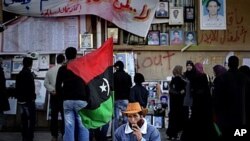Rebels in Libya continue to battle forces loyal to leader Moammar Gadhafi for control of the country. Many in the rebel hub of Benghazi have mixed emotions about the conflict.
|
Scott Bobb reports from the scene:
|
The people of Benghazi feel that they have obtained their freedom after about more than 40 years of oppression. Everyone I speak to from the highest public official down to the guy on the street say that they will never give this up and they would rather die.
Mixed with that, is apprehension about how it's going. The fighting has entered a sort of stalemate, ranging over a 50-100 kilometer stretch, 200 kilometers west of Benghazi. These mostly oil towns are pretty heavily damaged.
In the third largest city, Misrata, which is close to Tripoli, about 200 kilometers east, that has been under siege for a month with no water or electricity and severe problems with people wounded and dead.
So, it's a combination of jubilation from here, apprehension about the future, and worry about family and loved ones who are in some of the zones of conflict.
There is though, some criticism. The people here wish the United States and other Western nations would do more. They feel that NATO has not been very robust in enforcing the no-fly zone and eliminating the heavy weapons and artillery of the Gadhafi forces. So, there's a frustration there.
When I speak to people, they are always tell me, 'Tell your government to come and help us. This is a great opportunity to bring freedom, not just to Libya, but to the region."
Despite the military uncertainty, rebels in Benghazi are moving forward with plans for political change.
"They have set up a council that acts as something like a legislative body with 31 members: thirteen of whom have been appointed, but the others have not been appointed or announced because they are to come from the other regions of Libya, the western part that is still controlled by the government forces.
Underneath this is what they call the semi-legislative, policy-making oversight unit - what they are calling a crisis team which is assuming executive functions, such as trying to get policemen back on the streets, having the garbage picked up, administering the government.
They have also appointed a head of the petroleum industry and the central bank just a few days ago. The idea is to try to get some revenue flowing from the petroleum industry, and they just exported their first 100,000 barrels of oil two days ago, and also to have a central bank to control the money and the liquidity. Many of the banks are not opening because they have no cash to distribute, and so this is a looming problem too.
So, we're not really in a transition yet, but the beginnings and the attempts to start some sort of authority and some sort of administration are under way."




